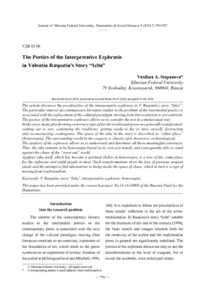The Poetics of the Interpretative Ecphrasis in Valentin Rasputin’s Story “Izba”
Скачать файл:
URI (для ссылок/цитирований):
https://elib.sfu-kras.ru/handle/2311/10363Автор:
Stepanova, Vasilina А.
Степанова, В.А.
Дата:
2014-05Аннотация:
The article discusses the peculiarities of the interpretative ecphrasis in V. Rasputin’s story “Izba1”.
The particular interest of contemporary literature studies to the problem of the intermedial poetics is
associated with the replacement of the cultural paradigm: moving from literocentrism to art-centrism.
The poetics of the interpretative ecphrasis allows us to consider the text in a metatextual way.
In the story, many plot-forming constructs typical for the traditional prose are generally transformed:
coming out to war, continuing the traditions, getting ready to die or inter oneself, destructing
and reconstructing cosmogonia. The space of the izba in the story is described as “other place”
(heterotopia). The surrounding world in the exegesis is chaotic and, moreover, eschatological.
The analysis of the ecphrasis allows us to understand and determine all these meaningful constructs.
Thus, the izba remains to be heterotopia based on its own axis mundi, and consequently able to stand
against the chaos of the “worn-out” world.
Agafya’s izba itself, which has become a spiritual shelter in heterotopia, is a tree of life, some place
for the righteous and sinful people to meet. Such transformations show the loss of previous utopian
ideals and the attempt to find alternatives to being inside the space of chaos, which in turn is a sign of
moving from traditionalism Статья посвящена анализу особенностей реализации толковательного экфрасиса в рассказе
В. Распутина “ Изба “. Особый интерес современного литературоведения к интермедиальной
поэтике современной прозы связан с очередной сменой культурной парадигмы, отходом
от литературоцентризма в сторону “искусствоцентризма”. Поэтика толковательного
экфрасиса позволяет рассматривать текст на метатекстуальном уровне.
В рассказе трансформированы многие сюжетообразующие конструкты, свойственные
традиционалистской прозе в целом: уход на войну, продолжение или прерывание традиций,
подготовка к смерти и погребению, разрушение и воссоздание космогонии. Пространство
избы в рассказе описано как “другое место” (гетеротопия). Мир окрест в экзегезисе явлен как
хаотичный и, более того, эсхатологический.
Анализ экфрасиса позволяет выявить смыслообразующие конструкты. Таким образом,
изба остается инопространством, основанным на своей собственной axis mundi, и поэтому
способным выстоять посреди хаоса “износившегося” мира. Своеобразным древом жизни
становится сам дом Агафьи, ставший духовным пристанищем в инобытии, некой точкой
встречи для праведных и грешных, своих и чужих. Подобные трансформации свидетельствуют
об утрате прежних, утопических, идеалов и о попытке поиска альтернативы бытия внутри
пространства хаоса, что, в свою очередь, является признаком отхода от традиционализма

